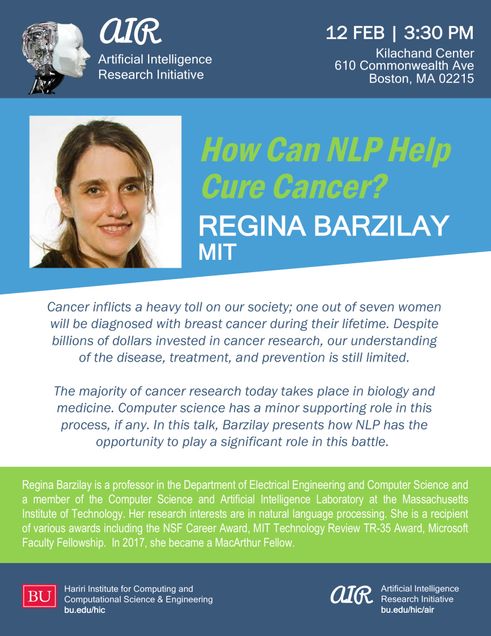“How Can NLP Help Cure Cancer?”
Regina Barzilay, professor in the Department of Electrical Engineering and Computer Science and member of the Computer Science and Artificial Intelligence Laboratory at MIT, drew a crowd of over 60 people at AIR‘s first seminar of the spring semester. Recipient of various awards including of the NSF Career Award, the MIT Technology Review TR-35 Award, and the Microsoft Faculty Fellowship, Barzilay explained the drawbacks of the necessity of human-interpretion in cancer research, and how computer science has the opportunity to play a significant role in improving it.

Despite the billions of dollars invested in cancer research, Barzilay pointed out that our understanding of the disease, treatment, and prevention is still incredibly limited. Ninety-seven percent of clinical trial data is disregarded, as data currently needs to be manually interpreted and analyzed by trained physicians. Thus, it becomes susceptible to human error, and when information is missing or false, it becomes incorrectly interpreted. Barzilay, a breast cancer survivor herself, shows her own mammograms from two years prior leading up to discovery, pointing out that the cancer was minuscule and brewing in earlier imaging, but undiscovered and undiagnosed for three years. Typically, she explains, cancer is misdiagnosed by a year.
As a result, Barzilay joined a team of researchers and physicians at Massachusetts General Hospital (MGH) to further explore how this can be improved. After extracting the outcomes of the data from testing cancer patients at MGH, Barzilay combined them in order to answer insightful questions and built a predictive system using the test results as training data. By doing so, Barzilay exponentially improved the amount of cases encountered in previous case data, and her system is currently used at the hospital daily, with many other medical centers approaching her to use their data as well.

The AIR initiative at BU brings together researchers whose work aims to create intelligent systems that learn to make decisions, reason about data, and communicate with humans. The initiative crosses the boundaries of computer vision, natural language processing, machine learning, robotics, and human-computer interaction research and promotes AI education at Boston University. The AIR seminar series features presentations by both BU and external guest speakers, including topics such as computer vision, natural language processing, machine learning, robotics, and human-computer interaction.
About the seminar

How Can NLP Help Cure Cancer?
Abstract: Cancer inflicts a heavy toll on our society. One out of seven women will be diagnosed with breast cancer during their lifetime, a fraction of them contributing to about 450,000 deaths annually worldwide. Despite billions of dollars invested in cancer research, our understanding of the disease, treatment, and prevention is still limited.
The majority of cancer research today takes place in biology and medicine. Computer science plays a minor supporting role in this process if at all. In this talk, I hope to convince you that NLP as a field has a chance to play a significant role in this battle. Indeed, free-form text remains the primary means by which physicians record their observations and clinical findings. Unfortunately, this rich source of textual information is severely underutilized by predictive models in oncology. Current models rely primarily only on structured data.
In the first part of my talk, I will describe a number of tasks where NLP-based models can make a difference in clinical practice. For example, these include improving models of disease progression, preventing over-treatment, and narrowing down to the cure. This part of the talk draws on active collaborations with oncologists from Massachusetts General Hospital (MGH).
In the second part of the talk, I will push beyond standard tools, introducing new functionalities and avoiding annotation-hungry training paradigms ill-suited for clinical practice. In particular, I will focus on interpretable neural models that provide rationales underlying their predictions, and semi-supervised methods for information extraction.
Bio: Regina Barzilay is a professor in the Department of Electrical Engineering and Computer Science and a member of the Computer Science and Artificial Intelligence Laboratory at the Massachusetts Institute of Technology. Her research interests are in natural language processing. She is a recipient of various awards including of the NSF Career Award, the MIT Technology Review TR-35 Award, Microsoft Faculty Fellowship and several Best Paper Awards at NAACL and ACL. In 2017, she became MacArthur Fellow. She received her Ph.D. in Computer Science from Columbia University, and spent a year as a postdoc at Cornell University.
[Read more about the AIR Initiative]